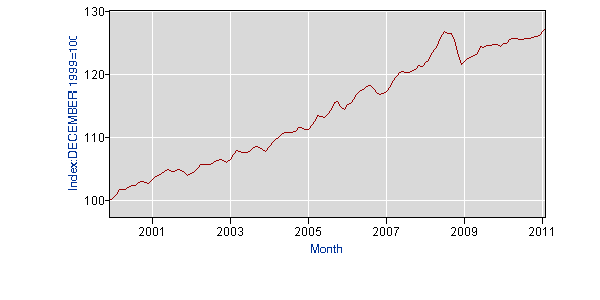March 19, 2011
CNBC and USA Today told readers the shocking news that:
“A special index created by the Labor Department to measure the actual cost of living for Americans hit a record high in February, according to data released Thursday, surpassing the old high in July 2008.”
The piece later went on to present a comment from Stephen Weiss, who is identified as being with Short Hills Capital:
“This speaks to the need for the Fed to include food and energy when they look at inflation rather than regard them as transient costs.”
Actually this story is incredibly confused in almost every dimension. Prices rise almost every month with this “special index” and every other consumer price index as can be seen in the chart below.

Source: Bureau of Labor Statistics.
There was an extraordinary surge in commodity prices at the beginning of 2008 which was reversed when the world economy sank into recession. Now that the economy is starting to recover and developing countries like China and India are growing rapidly, prices for commodities are recovering from their recession slump. It was entirely predictable that prices would reach a “record high” again as they did in 1999, 2000, 2001, 2002, etc.
This news also provides no reason whatsoever why the Fed should shift its focus from core inflation, which excludes food and energy prices, to the broader measure that includes these prices. The Fed’s actions will have virtually no effect on food and energy prices. These will be determined by world demand. The Fed could raise rates and slow growth in the U.S., but this would have only a marginal impact on the price of food and energy worldwide. Unless we can find a way to slow growth in China, India, and Latin America, we are not likely to see much reduction in food and energy prices.







Comments